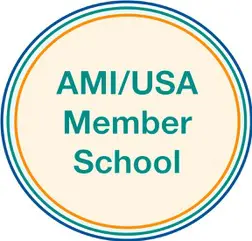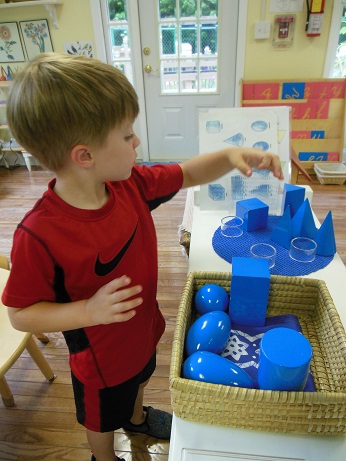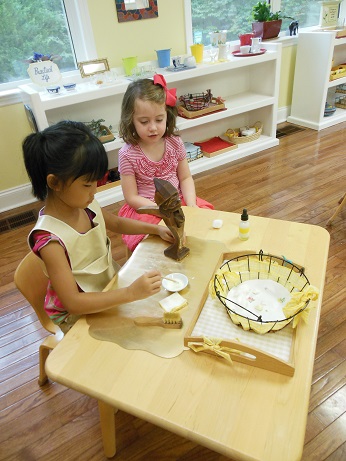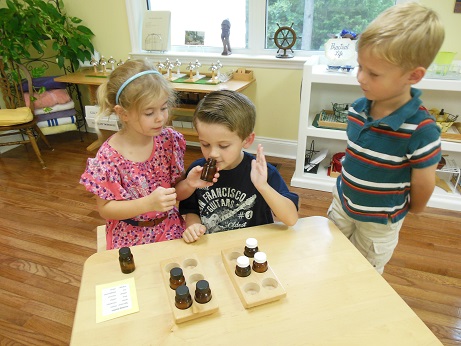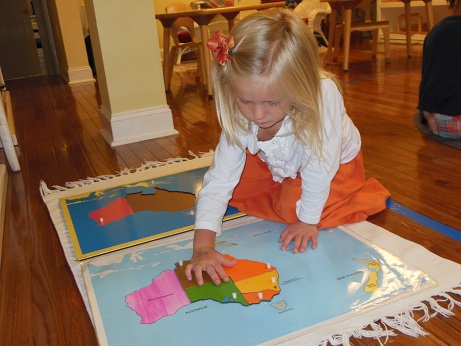Who is Maria Montessori?
a. What are the basic concepts of Montessori?
b. How is a Montessori Class Structured
c.How are Montessori teachers trained?
d. Are there any group activities in a Montessori class?
e. What is the Montessori concept of discipline?
f. Is Montessori affiliated with a religion?
g. How will my child respond when leaving the Montessori environment for another school?
h. What is the difference between Montessori and traditional education?
i. Is Montessori good for children with learning disabilities? What about gifted children?
j. Are Montessori children successful later in life?
k.What are the names of famous Montessori graduates?
l. Is there room for creativity in a Montessori program?
m. What are the teacher to student ratios?
ANSWERS
Montessori (pronounced MON-tuh-SORE-ee) education was founded in 1907 by Dr. Maria Montessori, the first woman in Italy to become a physician. She based her educational methods on scientific observation of children’s learning processes. Guided by her discovery that children teach themselves, Dr. Montessori designed a “prepared environment” in which children could freely choose from a number of developmentally appropriate activities. Dr. Montessori was an accomplished woman born into a time in history that did not readily adopt new ideas, particularly those established by women, into the mainstream.
- The basic Montessori concepts are:
- The child proceeds at his/her own pace in an environment prepared to provide means of learning.
- Imaginative teaching materials are the heart of the process.
- Materials are self-correcting, enabling the child to proceed at this own pace and discover his own mistakes.
- The teacher observes and guides the child to the appropriate learning path and materials.
- A Montessori class is ungraded with an age spans covering several years (0-2 1/2 ), (2 1/2 -6), (6-9), and (9-12). There are a wide range of activities available to the children at all ages and maturity levels which reinforce and make possible the Montessori ideals of individualized work, success, and independence. The combination of differences allows the children the opportunity to learn from each other and permits the older children to reinforce their knowledge by sharing their skills with the younger children. The third year at the Early Childhood level (Kindergarten age) is of unique importance and we encourage five-year old children to remain with the Early Childhood level class. Montessori is a developmental educational program allowing the children to progress at their own pace.
Since Montessori believes that children learn best through their own efforts, the role of the Montessori teacher is that of an ‘objective observer.’ The teacher’s job is to prepare an environment that teaches – constantly adding new materials for the child to learn specific concepts. The teacher’s job is to help the child achieve independence and accept responsibility. Teachers are trained to identify learning challenges and recognize developmental delays so the child can get help at the earliest possible time. - There are training programs for certifying teachers in Infant/Toddler, Early Childhood, Elementary and Secondary Education. Each program consists of Montessori philosophy, academic studies, observation, internship and research. Training is available through several major training associations requiring private Post Secondary Education authorization. Many colleges/universities offer Montessori Certification as part of their Education Program. Qualified Montessori Teachers earn a teaching certificate which they display proudly in their classrooms.
- Although the emphasis in Montessori is on a child’s ability to grow and progress on an individual basis, there are ample opportunities for them to socialize with the other children in the class. There are regular gatherings of the class as a whole for activities such as lunch, linetime, storytelling, music, planning for future events and for discussion of matters relating to the group as a whole. We encourage a community spirit among each individual class and from each class to the school as a whole.
- The Montessori curriculum provides the child with challenging work, whereby the child learns to focus and complete meaningful tasks. Dr. Montessori found that many undisciplined children were really frustrated by the lack of proper stimulation for their minds or by adult interference. When a child’s intellectual energies are used in a constructive manner there is none left over for mischievousness or deviation. When the children are totally absorbed and happy at what they are doing, then a true ‘inner discipline’ is achieved
- Montessori is not affiliated with any religion. The Montessori curriculum is used worldwide by church schools as well as private and public schools.
- The goal of a Montessori education is that children will develop problem solving skills to help them adjust to any new situation – socially or academically. Children develop a strong self-image because of the successful accomplishments they have had every day at Montessori school. Sometimes children are more advanced in their studies compared to a traditional curriculum and will need enrichment activities to challenge them. The Montessori philosophy sets no limits on what children can achieve. Individual children learn at different rates and those differences are respected. Some children may miss their freedom to make choices and move freely in their environment. Peer teaching is encouraged in Montessori and they may not find this philosophy embraced in other programs. It has been our experience that most transitions are made quickly because children are flexible and adjust.
- Montessori emphasizes learning through all five senses, not just through listening, watching, or reading. Children in Montessori classes learn at their own, individual pace and according to their own choice of activities from hundreds of possibilities. Learning is an exciting process of discovery, leading to concentration, motivation, self-discipline, and a love of learning. Montessori classes place children in three-year age groups (21/2-6, 6-9, 9-12, and so on), forming communities in which the older children spontaneously share their knowledge with the younger ones. Montessori represents an entirely different approach to education.
- Montessori is designed to help all children reach their fullest potential at their own unique pace. A classroom whose children have varying abilities is a community in which everyone learns from one another and everyone contributes. Moreover, multi-age grouping allows each child to find his or her own pace without feeling “ahead” or “behind” in relation to peers.
- Research studies show that Montessori children are well prepared for later life academically, socially, and emotionally. In addition to scoring well on standardized tests, Montessori children are ranked above average on such criteria as following directions, turning in work on time, listening attentively, using basic skills, showing responsibility, asking provocative questions, showing enthusiasm for learning, and adapting to new situations. There are also many outstanding and illustrious Montessori graduates, bot past and present, that have had profound influence on our world.
- These are only a few:Joshua Bell, violinist,Jeff Bezos, founder & CEO of Amazon.com,T. Berry Brazelton,noted pediatrician, Sergey Brin & Larry Page, founders of Google, Taylor Swift- singer, Beyonce, Knowles-singer, Julia Child, chef and author, George Clooney, actor, Peter Drucker, management guru, Anne Frank, WWII diarist,Katherine Graham, past owner and editor, Washington Post,Helen Hunt, actress,Gabriel Garcia Marquez, Nobel Prize winner for Literature,Jacqueline Kennedy Onassis, former first lady and book editor, Devi Sridhar, youngest-ever American Rhodes scholar,Jimmy Wales, founder of Wikipedia,
More Montessori students: Sean “P. Diddy” Combs, George Clooney, Helen Keller, HM Queen Noor of Jordan, Prince William and Prince Harry of Wales
Montessori parents: Bill and Hillary Clinton; Willie Nelson; Steve Tyler, Joe Perry and Brad Whitford of Aerosmith; Yo Yo Ma
Montessori advocates: Erik Erikson, Sigmund Freud, Buckminster Fuller, Mahatma Gandhi, the Dalai Lama, Fred Rogers, Bertrand Russell, Leo Tolstoy
Alexander Graham Bell founded two of the first Montessori schools in the U.S. and Canada.
Thomas Edison founded a Montessori school in the U.S.
Jean Piaget, noted psychologist, was head of the Swiss Montessori Society.
Woodrow Wilson created a Montessori classroom in the basement of the White House for his daughter.
l. We have a large selection of art materials available to the children, and we rotate our materials to offer different options. The students create collages, paint with watercolor or other media. Our curriculum includes singing, listening to various types of music, the Montessori bells, classical music, melodies and sounds from Asia and from different continents, etc. The children participate in dancing, creative movement, rhythm instruments, and Ms. Hanne plays the guitar. The Montessori materials also lend themselves to exploring one’s creativity, for example, when decorating front covers for booklets or designing beautiful borders. Famous Art is displayed throughout the classrooms. In addition, when playing outside, the children use their creativity and imagination.
m. There is typically one teacher in a Montessori class, with one, sometimes two assistants. Lessons are given on an individual, one-to-one basis to each student, unlike in any other preschool classroom settings. Sometimes there are small group lessons with three of four students interacting, such as with geography or language cards. A Montessori class is comprised of students of mixed ages. Some children are as young as two and a half, and others are already six years of age. The older children who have attended our school for about one or two years already, serve as mentors and role models for the the younger ones. They help the young children assume more responsibilities and guide them, just like the adults in the classroom, when they need encouragement or assistance. They also give lessons to the younger children, thus grooming their own leadership skills.
A Montessori classroom feels calm to an observer, and it is, with children interacting and treating one another with kindness. Also, after children receive lessons, they may choose and practice without having to ask the teacher every time, thus developing greater independence and inner discipline, and responsibility for themselves. The dynamics in a Montessori school are totally different from traditional preschools, where you normally have just one age group by itself.

